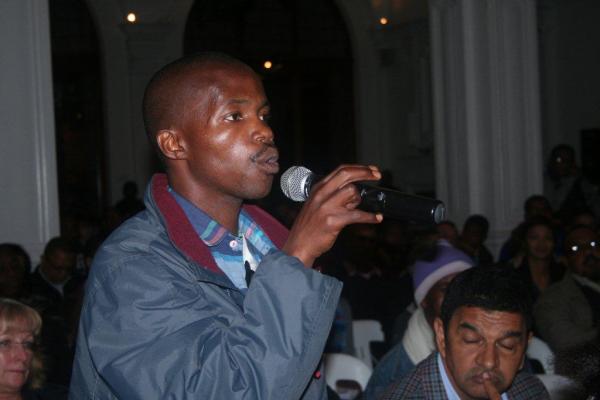Public meeting on gangsterism in schools

The spotlight was on gangsterism in the Western Cape again on Tuesday when community safety MEC Dan Plato and conflict resolution practitioner Irvin Kinnes held a public dialogue on the issue.
Plato said that 60 percent of drug and gang related crimes occur in the Western Cape, even thought the province has only 10 percent of the South Africa’s population.
“Gangsters are not isolated. They are fathers, uncles, family members. They are socialised. We need to work together to stop gangsterism in our schools,” Plato said.
He added that the Department of Education was piloting efforts to stop gang violence. He gave the example of a project in Delft where learners are escorted to school then fetched by bus after school and taken home.
The meeting was held at the Centre for Conflict Resolution in Observatory. A variety of people attended, including school learners still in their uniforms, youngsters dressed in Equal Education t-shirts, and Khayelitsha residents who are worried about increasing gangsterism in their area.
Kinnes said some gangsters made it a point to recruit young learners, especially when drugs were involved. According to him, some learners involved in gangs attended school everyday, but not for educational purposes.
“They come to school to specifically work on teachers nerves and to disrupt. There was an incident where one learner brought a firearm to school and wanted to shoot another learner. Educators must also take responsibility. They ought to take care of learners. But it is difficult because these learners demand to be respected by teachers and at the same time teachers want to be respected by their learners,” Kinnes said.
During the question and answer part of the dialogue, Khayelitsha resident Gladys Thomas asked what they were expected to do in a community where people were poor and lived in poverty.
“How do you explain what gangsterism is to an old uneducated woman in the township? Gangsterism is growing in Kuyasa. Only five police vans are servicing Harare and that is affecting the community. We patrol Friday to Sunday from 9pm to 3am. What else are we expected to do?” Thomas asked.
A man who refused to identify himself caused an uproar when he stood up and asked why the dialogue was being held in Cape Town and not taken to the people in the townships where gangsterism is happening.
Another, who identified himself as Sizwe, said lack of communication between the community and government was also a big problem.
Kinnes said, “Communities have to become organised. It only takes one or two people to make a difference, it does not take a whole army. I think we must work together as government and stop the politicking about gangsterism.”
Support independent journalism
Donate using Payfast

Don't miss out on the latest news
We respect your privacy, and promise we won't spam you.
Next: Training for health workers about sex workers
Previous: Government continues to fail the youth

This article is licensed under a Creative Commons Attribution-NoDerivatives 4.0 International License.
